Celebrating the passion, dedication and personal stories of Social Ecology faculty, staff, students, alumni and benefactors, “The Dean Asks…” is a feature in which Dean Valerie Jenness interviews people inspired by the pursuit of excellence and encourages participation in interdisciplinary education to solve complex societal problems. Please check back to read or listen to additional installments. View Archive
Valerie Jenness, Dean of the School of Social Ecology, interviewed alumna Kristen Knowles '88 about her memories as a student, current business endeavors and commitment to Field Study students.
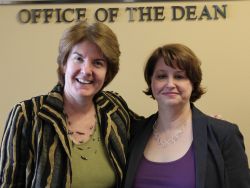 Val: Looking back at your time UCI when you were a student in the School of Social Ecology, tell us about this time period in your life and the experiences you remember.
Val: Looking back at your time UCI when you were a student in the School of Social Ecology, tell us about this time period in your life and the experiences you remember.
Kristen: I attended UCI from 1984 through 1988. My time at UCI really was a fantastic time in my life. I went away to college, so I was far enough away from my parents, but I was still in the same state. I came to UCI specifically for Social Ecology, which at the time was still a program. We weren't a school yet. I had a very smart high school counselor who knew my personality, abilities, and that I wanted to go to law school. At the time, I didn't know I would end up being a private investigator. My counselor found the Social Ecology program for me and encouraged me to visit UCI and consider it. I could have gone to Sacramento State Criminal Justice program because they offered me a scholarship. I turned it down to come here, which offered so many more things for me.
Val: When you got to campus, what was the campus like, and what was Social Ecology like at the time?
Kristen: Well, it was small. We were the smallest program, as I recall. It was a small group of people. You knew almost all of them. I think everybody knew each other. And if you didn't know each other you knew them by sight. So that was nice. I grew up in a very small town in Connecticut, and I had only lived in California for four years.
Val: Where did you live in California?
Kristen: In Santa Rosa. So this was a very diverse group of people compared to where I grew up. UCI was actually bigger than the town I grew up in in Connecticut. It just was so comfortable, and it was a great place to learn. All the professors were great. To this day, I know some of them still. I don't know if all of them would remember me by name. Many of them do because I work with some of them now. I was in heaven. I mean, they had me taking all my criminal justice and all the, you know, the punish-what was it, crimes…?
Val: Punishment, Corrections, Crimes.
Kristen: I took Family Law with Bill Thompson.
Val: Were there things within that time period in your life that particularly stand out as maybe memorable or transformative?
Kristen: Well, there were. I mean, not all of them were Social Ecology things. We had a bowling team back then. I don't know if you guys know that, but UCI had a bowling team. We traveled intercollegiately through different states. We were very good. To this day, I am very good friends with many people on that team.
Val: How did you make that transition from wanting to be an attorney to being in the field of private investigations? What happened to kind of route you in that direction?
Kristen: Field study.
Val: Talk about that a little bit.
Kristen: Field study was over at the public defender’s office, Orange County Public Defender Juvenile Branch, and I worked there. I actually did two quarters. I was over there all the time. I looked really young. I mean, I looked like I was one of the kids in the facility. I'd interview kids eight hours a day.
Val: Did you choose that field study?
Kristen: I chose it. It was great because I interviewed kids. That was hard because a lot of those kids' problems were their parents, which was devastating to me, because my parents are a big part of my life and really molded me. With a lot of these kids you’d say, “Where’s your mom?” and they would say “She was arrested with me,” so a lot of these kids didn't have anybody supporting them or giving them any kind of direction. And here I am, the one person who is not their age, but not far from their age.
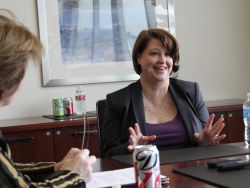 Val: You might have been five, seven years older, right?
Val: You might have been five, seven years older, right?
Kristen: I was maybe 21, 22 and I was 5 foot 1. A lot of the kids were bigger than me. Here they are; they have somebody that's listening to them and hearing their story and not yelling at them. They had somebody that was on their side for the first time. I would take what I'd learned and write it up in a report, and I'd give that to the public defender. The PD would use that in the court. So I had to really pay attention to what they were telling me. You had to learn how to digest it, get it down there so the public defender could go into court and represent this kid and do the best for them, because you were the only voice they had that day.
When it was time to graduate, I needed a job, and they wanted to hire me. It was a stepping stone toward going to law school But getting hired into a county job, there's red tape; there's getting through all these interviews. A friend of mine, one of the head interviewers, suggested that I should go work for a private investigator. I thought that was the silliest idea I’ve ever heard in my life because all I knew of PIs was on TV. You had Rockford Files, and he ran, and he beat up people. I don't run. So the head interviewer got the name of a defense attorney she knew and found out who his PI was. I went and applied. The private investigator told me that he was not hiring at the time. But literally within a month, he called me and said, I have an opening. I went over and got the job. I graduated in June; I got the job in September of 1988.
Val: It's interesting, Kristen, because at the time, you were already learning this kind of ability to talk with people, kind of extract relevant information and put it in a context and then report it elsewhere.
Kristen: I think that's part of what my high school counselor knew. She knew I could talk to people. I had always been able to talk to people. I got along with everybody.
Val: Can you give people a little sense of the nature of your company and the work that you all do?
Kristen: Well, first of all, I worked for somebody else for five years. And you have to. In the world of PI-private investigation-you can't just go, I'm going to be a private investigator, and walk out and do it. You have to work for somebody else for many years to get your experience and you have to learn it in the field. You can't read it. You can't sit in the office. You have to have work experience. So you have to work for somebody else. So I did that, got licensed, got married. I actually got married and then got licensed.
Val: Did you do all the things we would expect? You're sitting in a car doing surveillance. You're writing reports. You're interviewing people.
Kristen: Back then, no. I wasn't doing surveillance. But I was interviewing people-lots of interviews. I was getting all the police reports, which is called discovery. You're getting the discovery from the district attorney. You're reading every single thing. You're making witness timelines. You know, you're putting together witness lists.
I was very lucky. I was the first Orange County investigator that learned DNA. So we just had to learn it. The attorney I was working with tossed it on my desk and said, we get to learn this. So you learn that. You learn who all the experts are. You learn how the science works. You learn who to connect with. And then you put it together.
Val: You bring all of that back to the attorney and you put a coherent story or statement about what's going on.
Kristen: Right. You develop the case. And the most perfect sense of what we do is we bring all the facts together the best you can because you're getting statements from people. You bring all the statements together. You bring as much as you can to the attorney, and you try to give it to them in one package. Then they go to court with it.
Now, if you have good attorneys, you work hand- in-hand You develop it together. And he'll ( you know-I say "he" a lot, because I have a lot of male attorneys. I have female attorneys also). But you become the team They cannot go to court without a good PI. Any attorney that says, "I can go to court without investigation or a good PI" is an attorney you do not want to work with. In 1993, we started our firm, my partner and I. And so it's been 20 years for our corporation. We'll be 21 years.
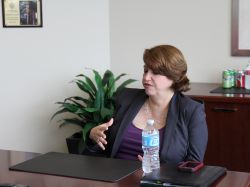 Val: Go ahead and say the name. Get a pitch.
Val: Go ahead and say the name. Get a pitch.
Kristen: Knowles and Vacca. It's changed names over the years, because we originally had four partners.
Val: I like that your name is first.
Kristen: Well, it's alphabetical. Though, if it was my maiden name, it'd be alphabetical anyway. Anyway, we do federal and criminal defense In that world, we'll always be defense. We do civil; we can be plaintiff or defense, depending on who hires us. We do corporate investigation. We do insurance; insurance, we can do sub-rosa and interviews. We do lots and lots of services, which are deposition subs, any kind of litigation subpoenas, summonses, surveillance.
Val: How do you think about the work you do?
Kristen: Different cases for different things. I have very set values for my criminal cases. I'm very anti-death penalty. I believe everybody really needs and is entitled to the best defense possible. I don't care who you are and where you come from, everybody is entitled to a diligent defense-that's our system. However, it's very, very one-sided. When you go into court, I don't care what anybody says about our system, it is the best system in the world but it is very one-sided. Whether you go into court and the jury says, oh, yeah, I can be open minded, you know, I can put everything aside, that's not true. The minute somebody's arrested and they walk in with a defense attorney, it's not even.
Val: The work you do and that your team does and your company does is a critical part of delivering on the promise of a zealous defense.
Kristen: Oh, absolutely. We don't do anything halfway. We make sure everybody puts forth the best effort ever. That's with every one of my investigators. I mean, what I love about my company is if I hand a case off to any of my associates, I just don't say, “Here, it's yours.” We talk every day. We have lunch together. We all talk about each others' cases. We help each other all the time. Civil is very different from criminal. There's much more money rolling around civil than there is criminal. That is to be made, and I'm not just saying, you know, that but it is a different dynamic in your head for me, and I don't know how this sounds-when somebody's liberty is at stake versus somebody's money. And not that I don't want to do my best, you know, if it's about money. That it's different, but it’s different.
Val: So are your values, Kristen, kind of underlying your company; it's real easy to see your company as helping deliver on the promise of how we adjudicate justice in this society.
Kristen: Yes, through the years, the court system has changed quite a bit. And unfortunately, where the cuts are, are in the court system. The people that are in charge of the purse strings do not understand what it takes to try a case. So they nit-pick you. They'll say, here's my greatest example: this guy's gone now, so I can say whatever I want. The guy, who was in charge of Orange County says, "Do you really need to talk to all 30 witnesses? Can't you just pick 6?" And you ask, "Would you like to choose them?"
Val: Or better yet, if you were the defendant, would you like us to just pick six?
Kristen: Yes. Or I'd say to him too, "Would you like to tell my client why you're limiting who we talk to?” "You can't have this expert. Pick one of these, because they'll do it for one hundred dollars." And I'm like, "No, we need this expert, because this is the expert we need."
Val: The budget's driving the process more than the promise of justice.
Kristen: Exactly. So over the years in Orange County, we've limited our work off the county. Many attorneys who are private-they used to do contract cases-have done it also, because they've just really limited our cases. And it's offensive.
Val: Thank you for taking our students as interns. We appreciate that.
Kristen: I love them.
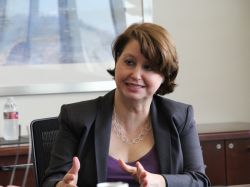 Val: What kind of things are you looking for when you're hiring new people? Is it their skills? Is it their values? Is it their work ethic?
Val: What kind of things are you looking for when you're hiring new people? Is it their skills? Is it their values? Is it their work ethic?
Kristen: Okay, it's multifaceted. When they come in as an intern for the first interview, it's a job interview. And everybody in my office, except for two people, have been through it: my office manager and my partner. My partner is a token Fullerton grad. So it's a job interview because they're coming into our office. They're dealing with highly confidential issues. We have them sign a Confidentiality Agreement. They're not allowed to talk about it outside the office. They can talk about generalities, but they can't talk about the cases. We have high-profile stuff in our office. And I mean we have some of the highest profile cases you'll see in the County, and in the State sometimes.
And so when they come in, we're looking for maturity. That's a good one. My biggest one-and I've talked to you about this-is common sense. People do not realize how valuable that is.
Val: It's such a horrible thing to lose.
Kristen: Common sense is, to me, an easy thing. It’s a basic thing. But it's such an important thing. To me, it's one of the biggest. It's more important than book smart because you can learn things. You can't learn common sense and innate skill and the comfort of being able to deal with people and not getting thrown off your game easy.
Val: I agree with you about common sense-and I want to put education in the mix here-is that hopefully, that allows people to bring something to your workplace as well.
Kristen: Right and that's what I've found-we only hire through our intern pool. Through the years, we've hired many of our interns. Not all of them have stayed, which is fine. Use us as a stepping stone. I think I know where the majority of my former interns or former interns that were employees are. If they're really good, and they've interned with us, we'll grab them before they even graduate. We're going to keep who we can.
Val: Why do you keep coming back to the well of Social Ecology? I know you've taken so many of our students. What are they doing for you? How is that working out?
Kristen: Well, it's twofold. One, because of where they're coming from, I know their experience here. I know what classes they're taking. I know UCI. I don't know the individual, but I know what they're going through because I've had a similar experience, I have that in common. When they say, I'm taking field study, I know exactly what they're doing. I ask them to show me their classes but I am not worried about grades. I'm not worried about what they know for sure, because a lot of what we do, they're not going to know.
Two, we like their life experience. We look to see what they write as a resume, what they've done in the past because some of the stuff they've done in the past helps us.
Val: Where do you see yourself going into the future? And what do you have left to accomplish? What do you have left to do? What do you want for the company?
Kristen: For the company, I hope the company stays strong as long as it can. I do know that we're very, very happy with who we have, and if that continues, well, then both my partner and I are very comfortable with continuing what we are doing. We've been in the field for 26 years. Well, next year it'll be 26 years. We're fairly young in the world of companies or corporations.
Val: Let me shift gears a little bit and ask you why the loyalty to the school?
Kristen: I really loved my time at UCI. I mean, that's not in any way to say that just to say it. I loved UCI. I loved Social Ecology. I was here when it was a program where nobody knew what the heck it was. I know that the professors are fabulous. I mean, like I said, when you UCI got Elizabeth Loftus, I was like, “Yay”, because I knew who she was way before she came here. I just have always stayed true to the school. The school's always been very good to us. So why would I ever walk away from that?
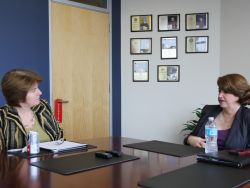 Val: I get asked a lot as Dean, what is the School of Social Ecology. How would you answer that question?
Val: I get asked a lot as Dean, what is the School of Social Ecology. How would you answer that question?
Kristen: Okay. The School of Social Ecology-we were a program-you had three different areas that we had to learn, which was Criminal Justice because that's what it was when I was here-Behavioral Science, and Urbanization. You took classes in all three of those areas. You cannot have one without the other, because they all interact with each other. By learning with those three, there's no way you can go to a neighborhood or a community and understand what's happening there without understanding all three of those facets, because they all interplay with each other. And because I had the education and learned that, it helps me in every avenue of my career.
Val: That is great. Now, there's the quote, right?
Kristen: How often have I said that? I have had to say that over and over and over. And I told every single intern we've had, "Do you have any idea how much this school has helped me in my career?" I understand every one of my experts, whether it be a psychologist, whether it be a psychiatrist, whether it be a sociologist, whether it be in economics, whether it be-believe it or not, my DNA. Oh, my gosh! I got through UCI without a math class except for that damn statistics I had to take. Then I learn DNA, and there's statistics in DNA!
I used to joke, I'll never use the word "paradigm" in my whole life. I'm at a conference on forensics, and I bump into Bill Thompson. It was when I started working. Bill liked ti introduce me to people and tell them "She was one of my students." We're at the conference; they use the word "paradigm"; he leans over, and he goes, "See? You're going to use the word 'paradigm.'"
Val: As someone who's kind of gone through our system, but in a different era, what would you say to our young undergraduate students? Maybe this kind of falls in the “I wish I'd have known back then what I know now” column.
Kristen: Well, this is kind of a hard one for me, because I don't have a lot of regrets looking back. I can't ever say I wish I knew this then, because everything kind of fell in line for me. I know that sounds awful but I fell into the job. The job was perfect. It turned out to be a blessing, because I found the people that I wanted, and we left together and started our own firm. I've been with my partner for 20-some-odd years. We're very lucky in that sense.
I said this at Career Night, and I think you remember this. Sometimes people have an idea what they want to do and they go out and follow that idea. You need to make your own niche. You say, this is what I want to do. There's no world for it. I need to create my own.
One of the things was back in the late eighties, early nineties, there weren't a lot of female investigators. There's a ton of us now. Matter of fact, there's quite a few that are UCI Social Ecology grads. I'm friends with them. They're all in Orange County. I know who they all are. But back then, there wasn't. You had to make your own way.
Val: You were also willing, though, at a very young age to create what you wanted.
Kristen: But you have to say what you want, and you have to go for it. You can't make the excuses that somebody's holding that back, because everybody can work toward it. I know that sounds like you're throwing it back at somebody. But honestly, if you want something, and you know you have the ability, do it. Sometimes, there is no box for it. You have to create your own box.
Val: I like that, "create your own box." That can be the title of this interview, right? "Kristen Knowles: Creating Your Own Box."
Kristen: You have to be willing to say, I'm going to work for somebody else for awhile. It's not a failure to say I'm going to just do this until I can figure out how to get to where I need to go. Or how to figure out to do what you want to do.
Val: No, it's not a failure. It's a part of the process.
Kristen: Exactly. It's a stepping stone.